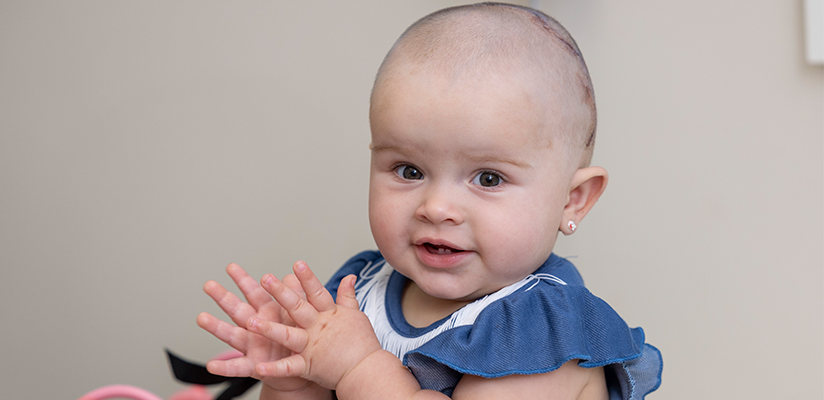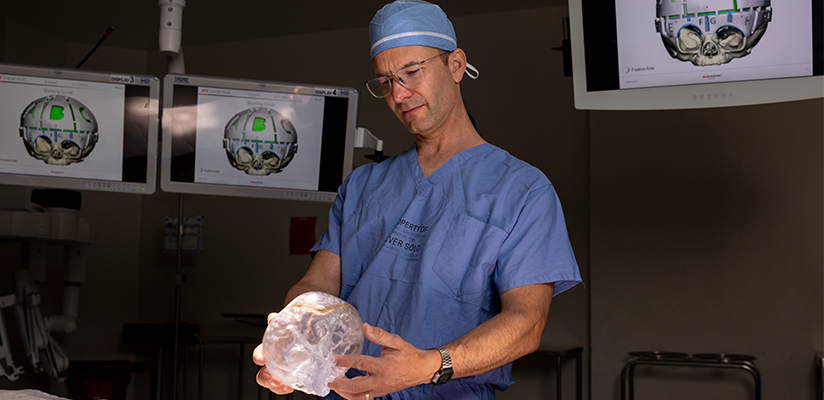At ¶¶ÒõÂþ», we believe that every child is different and that the care they receive should reflect that. The Craniofacial and Cleft Program at Le Bonheur Children’s Hospital offers a comprehensive and specialized approach to the care of children with craniofacial differences. Our program brings together a multidisciplinary team of highly skilled and experienced professionals who provide exceptional care. There are currently two separate clinics in the program: the craniofacial clinic and the cleft clinic.
The Craniofacial Clinic sees patients with craniofacial differences of the skull and face. The clinic sees patients of all ages, from infants to adults. This includes individuals with congenital craniofacial conditions such as craniosynostosis, hemifacial microsomia, or other rare genetic syndromes affecting the head and face. Additionally, patients who have had facial trauma or those requiring jaw surgery are also seen in the craniofacial clinic.
The Cleft Clinic is specifically designed to provide specialized care to individuals with cleft lip and/or cleft palate. The clinic serves patients of all ages, from prenatal to adult. Newborns with cleft lip and/or palate are often referred to the cleft clinic soon after birth for an initial assessment and to begin their comprehensive care journey. Children with clefts require ongoing treatment throughout their life. This includes surgical care, orthodontic care, speech therapy and other related services. We coordinate the care for you in a “one-stop shop” to make it easy on kids and families.
Why Choose Le Bonheur
Le Bonheur Children’s Hospital is renowned for its commitment to providing exceptional care for kids and their families. In association with the University of Tennessee, the Le Bonheur Craniofacial program is the only clinic to offer access to a complete and comprehensive list of services. No other clinic in the region can offer access to such a comprehensive group of specialties. It is the only regional clinic to be certified by the American Cleft Palate Association (ACPA). Being a leader in the care of craniofacial differences, we use the most advanced techniques and technologies. With a holistic approach to the family, we offer a child-friendly environment, playrooms and support services for families.

Why is Helping Families with Craniofacial Differences Important?
Craniofacial differences play a significant role in our appreciation of human diversity. These variations in the structure and appearance of the head and face contribute to the unique identities and characteristics of individuals. Embracing and valuing craniofacial differences is essential for fostering a society that celebrates diversity and promotes inclusivity.
Recognizing the importance of craniofacial differences helps challenge societal beauty standards and stereotypes, promoting acceptance and respect for individuals with varying appearances. It encourages us to shift our focus from external appearances to the inherent value and potential of every person.
Furthermore, understanding craniofacial differences is crucial in the field of medicine and health care. It allows for specialized care and treatment tailored to the specific needs of individuals with craniofacial conditions, improving their quality of life and overall well-being. By embracing and appreciating craniofacial differences, we can build a more inclusive and compassionate society that values the inherent worth and uniqueness of every individual, regardless of their physical appearance.

Le Bonheur Craniofacial Program’s Commitment to Cutting-Edge Research and Innovation
The Le Bonheur Craniofacial Program is committed to advancing research and innovation in the field of craniofacial surgery and care. Through ongoing research endeavors, the program aims to improve treatment outcomes, develop new surgical techniques, and enhance the overall understanding of craniofacial conditions. Here are some highlights of the research and innovation initiatives within the Le Bonheur Craniofacial Program:
- Clinical Studies: The program actively engages in clinical studies to investigate various aspects of craniofacial conditions, including their etiology, clinical outcomes and the effectiveness of different treatment approaches. These studies sometimes involve collaborations with other research institutions and involve collecting and analyzing data from a large patient population. By studying these conditions, the program aims to improve patient care and optimize treatment strategies.
- Surgical Techniques and Innovations: The Le Bonheur Craniofacial Program is at the forefront of developing and refining surgical techniques for craniofacial conditions. The program's surgeons continuously explore innovative approaches to improve surgical outcomes, minimize complications and enhance aesthetic and functional results. This may involve the use of advanced imaging technologies, computer-assisted planning and intraoperative navigation systems to achieve precision and optimize surgical outcomes.
- Genetics and Genomic Research: The program recognizes the importance of understanding the genetic motives of craniofacial conditions. Through genetic and genomic research, the program aims to identify specific genetic markers, gene mutations or epigenetic abnormalities associated with craniofacial conditions. This research contributes to a better understanding of these conditions' causes and potentially opens avenues for targeted therapies and personalized treatment approaches.
- Collaboration with Research Institutions: We actively collaborate with research institutions, universities and other medical centers to facilitate interdisciplinary research and knowledge exchange. These collaborations foster innovation and promote a comprehensive understanding of craniofacial conditions. By working together with experts in various fields, the program leverages collective expertise to drive forward research and improve patient care.
- Education and Training: In addition to research, our craniofacial program emphasizes education and training for healthcare professionals. It provides opportunities for residents, fellows and medical students to engage in research projects and gain hands-on experience in craniofacial care. By nurturing the next generation of craniofacial specialists, the program ensures a continued focus on research and innovation in the field.
- Patient-Centered Outcomes Research: The program values the perspectives and experiences of patients and their families. Patient-centered outcomes research is conducted to assess the impact of craniofacial conditions and their treatments on quality of life, functional outcomes and overall well-being. This research helps to inform and shape patient care, ensuring that it aligns with the needs and preferences of the individuals and families affected by craniofacial conditions.
Through these research and innovation initiatives, the Le Bonheur Craniofacial Program remains at the forefront of advancing the field of craniofacial surgery and care. By combining clinical expertise, collaborative partnerships and a patient-centered approach, the program aims to continually improve outcomes, develop innovative treatments and enhance the overall well-being of individuals with craniofacial conditions.

Why Choose Le Bonheur?
At Le Bonheur Children’s, we measure and track our treatment to improve the care we offer families – and to provide a greater level of transparency about our program.
Learn More






